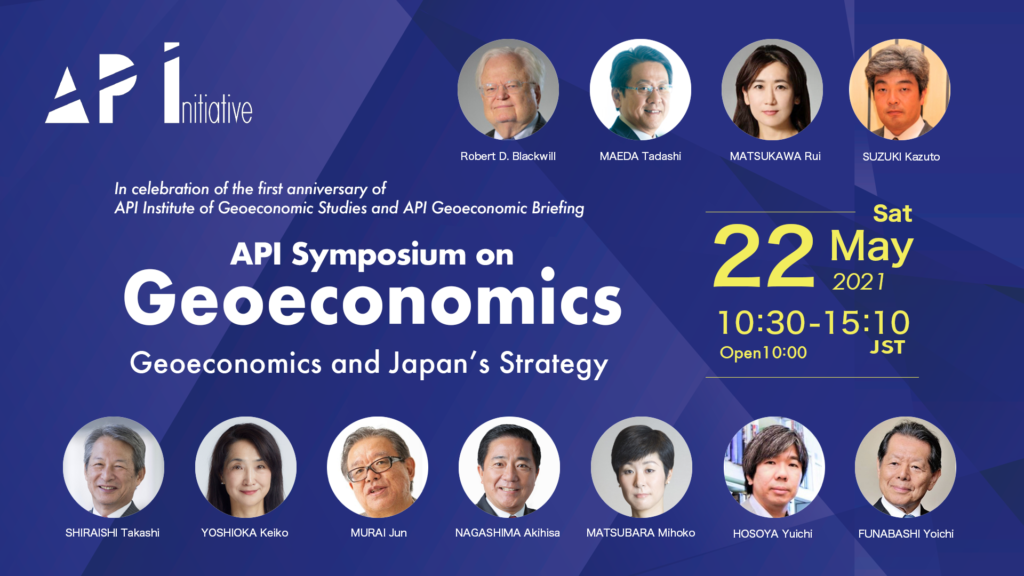【Added on June 22, 2021】The full script of Ambassador Blackwill’s keynote speech is available here. The recorded video can be viewed below.
Today, it has increasingly become important for us to remember a tradition that stretches back to the founding of our nations – “the systematic use of economic instruments to accomplish geopolitical objectives.”
We are living in an age of geoeconomics and therefore we must ask ourselves: what strategies should governments, corporations, and individuals develop and how should they deal with the geoeconomic challenges that continue to arise, such as tensions in US-China relations, human rights issues, and the Myanmar coup?
Asia-Pacific Initiative (API) established the API Institute of Geoeconomic Studies (Dean: MURAI Jun) in April 2020 and has been publishing the API Geoeconomic Briefing every week since May of the same year. In celebration of its first anniversary, API has invited Robert D. Blackwill, co-author of War by Other Means who argues in his recent report that Taiwan “is becoming the most dangerous flash point in the world for a possible war that involves the United States, China, and probably other major powers,” to hold the symposium as follows. Please join us for this special event.
【Added on June 22, 2021】The full script of Ambassador Blackwill’s keynote speech is available here.
Opening Remarks
Session 1 Keynote Speech “U.S.-China Relations and Geoeconomics: The U.S.-Japan Alliance in a New Situation”
Session 1 Panel Discussion ”Geoeconomic Strategies for Japan: Towards Building a National Security State”
Session 2 (1) ”Challenges in the Asia-Pacific Region”
Session 2 (2) ”Challenges in Cyber and Technology”
Closing Remarks
Date: Saturday, May 22, 2021, 10:00-15:10 (JST)
Venue: Zoom Webinar, Japanese and English w/Simultaneous Translation
Host: Asia Pacific Initiative (API)
PROGRAM
| 10:00 |
Zoom room opens for online symposium |
| 10:30 – 10:40 |
Opening Remarks:
FUNABASHI Yoichi, Chairman, API |
| 10:40 – 11:10 |
Session 1 Plenary Discussion: “Geoeconomics and Japan’s Strategy”
Keynote Speech: “U.S.-China Relations and Geoeconomics: The U.S.-Japan Alliance in a New Situation”
Robert D. Blackwill, Henry A. Kissinger Senior Fellow for U.S. Foreign Policy
Ambassador Blackwill, a geoeconomics expert, will discuss the topic of “What geo-economic risks may arise in areas relating to the Biden administration’s policy toward China? The role of the Japan-U.S. alliance and expectations of Japan from the U.S. perspective.” |
| 11:15 – 12:15 |
Panel Discussion
”Geoeconomic Strategies for Japan: Towards Building a National Security State”
Moderator:
FUNABASHI Yoichi, Chairman, API
Panelists:
Robert D. Blackwill, Henry A. Kissinger Senior Fellow for U.S. Foreign Policy
MAEDA Tadashi, Governor & Representative Director, Japan Bank for International Cooperation (JBIC)
MATSUKAWA Rui, Member, House of Councilors; Parliamentary Vice-Minister of Defense; Parliamentary Vice-Minister of Cabinet Office
Following the keynote speech, we will discuss how Japan should develop a strategy to build a national security state through “a whole of society approach”, as well as what role the Japanese government and its agencies should play and how companies should navigate these issues. Questions from the audience will also be answered. |
| 12:15 – 13:00 |
Lunch Break |
| 13:00 – 14:00 |
Session 2 Discussion: ”From the Frontier of Geoeconomic Challenges”
(1)”Challenges in the Asia-Pacific Region”
Moderator:
SUZUKI Kazuto, Senior Research Fellow, API; Professor, Graduate School of Public Policy, The University of Tokyo
Panelists:
SHIRAISHI Takashi, Chancellor, Prefectural University of Kumamoto
YOSHIOKA Keiko, Senior Staff Writer, The Asahi Shimbun
In the second part of the symposium, we will discuss individual issues. In the first session, we will discuss China’s attempts to change the status quo in the Asia-Pacific and its implications for the region, as well as the U.S. role and presence. What kind of geoeconomic challenges are countries facing when they are caught between the alliance-oriented United States and a China that is promoting its Belt and Road Initiative? We will discuss Japan’s mission and what role it is expected to play at this moment. |
| 14:05 – 15:05 |
(2)”Challenges in Cyber and Technology”
Moderator:
MURAI Jun, Dean, API Institute of Geo-economic Studies and API Senior Fellow; Distinguished
Professor, Keio University; Co-Director, Keio University Cyber Civilization Research Center, Special Advisor to the Cabinet on Digital Policy
Panelists:
NAGASHIMA Akihisa, Member, House of Representatives
MATSUBARA Mihoko, Chief Cybersecurity Strategist, NTT Corporation, Tokyo
In the latter half of the second part, we discuss how the field of geoeconomic challenges is a power game in which the leading U.S. and Chinese companies, so called GAFA and BATH, are competing with each other. We will discuss what role Japan can play and how it can take responsibility in cyberspace to contribute to its security, including how it can lead the charge in distribution of secure data. In addition, we ask what is required of Japan for the development of a free and open cyber space, and how industry, government and academia should work towards this goal. |
| 15:05 – 15:10 |
Closing Remarks
HOSOYA Yuichi, Managing Director, Research Director, API; Professor, Faculty of Law, Keio University |
| 15:10 |
Symposium closes |
Speakers
Robert D. Blackwill
Henry A. Kissinger Senior Fellow for U.S. Foreign Policy at the Council on Foreign Relations (CFR)
Robert D. Blackwill is the Henry A. Kissinger senior fellow for U.S. foreign policy at the Council on Foreign Relations (CFR). Under President George W. Bush, Blackwill served as deputy assistant to the president and deputy national security advisor for strategic planning. He was also U.S. ambassador to India from 2001 to 2003. Blackwill’s most recent book is War by Other Means: Geoeconomics and Statecraft (Harvard University Press, April 2016), coauthored with Jennifer M. Harris. He and Dr. Philip Zelikow coauthored the CFR Special Report The United States, China, and Taiwan: A Strategy to Prevent War (February 2021) and a March 1, 2021 War on the Rocks article “Can the United States Prevent a War Over Taiwan?,” which addresses reactions to the CFR Report.
He is a member of CFR, the Aspen Strategy Group, and the International Institute for Strategic Studies.
MAEDA Tadashi
Governor & Representative Director
Japan Bank for International Cooperation
Graduated University of Tokyo Faculty of Law in 1980. At JBIC, he has held various positions including Director-General of Energy and Natural Resources Finance Department; Director-General of Corporate Planning Department ; Managing Executive Officer, Global Head of Infrastructure and Environment Finance Group; Senior Managing Director and CEO, Executive Managing Director. From June 2010 to December 2012 he served as Special Advisor to the Cabinet in the Government of Japan. He has also served as a member of the Steering Committee of Nuclear Damage Liability Facilitation Fund from October 2011 to October 2013. He became a member of the IISS Council from June 2014 to 2017.
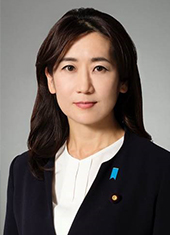
MATSUKAWA Rui
Member, House of Councilors
Parliamentary Vice-Minister of Defense; Parliamentary Vice-Minister of Cabinet Office
Education
Mar 1986 Graduated from Shitennoji Junior High School
Mar 1989 Graduated from Shitennoji Senior High School
Mar 1993 Graduated from the University of Tokyo Faculty of Law
Oct 1997 Graduated from Georgetown University School of Foreign Service
Political Career
Apr 1993 Joined Ministry of Foreign Affairs (MOFA)
1999-2002 Treaties Division, MOFA
2002-2004 Assistant Director, Regional Policy Division, Asian and Oceanian Affairs Bureau, MOFA
2004-2006 First Secretary, Delegation of Japan to the Conference on Disarmament (Switzerland)
2009-2011 Deputy-Director, Intelligence and Analysis Service, MOFA
2011-2013 Deputy Secretary-General, Trilateral Cooperation Secretariat (Republic of Korea)
2014-2016 Director, Gender Mainstreaming Division, Foreign Policy Bureau, MOFA
Feb 2016 Retired from MOFA
July 2016 Elected to the House of Councilors in Osaka Prefecture (first term)
(HC) Member, Committee on Foreign Affairs and Defense
Member, Committee on Budget
Director, Special Committee on ODA and Related Matters
and others
(LDP) Deputy Director, Foreign Affairs Division
Deputy Director, Economy, Trade and Industry Division
Deputy Director-General, International Bureau
Deputy Director, Women’s Affairs Division
Chief Secretary, Headquarters for Promoting women’s Active Participation
Vice President, Central Institute of Politics
and others
Sep 2020 Parliamentary Vice-Minister of Defense
Parliamentary Vice-Minister of Cabinet Office
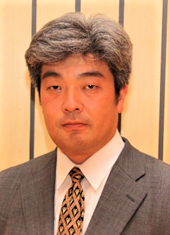
SUZUKI Kazuto
API Senior Research Fellow
Professor, Graduate School of Public Policy, The University of Tokyo
SUZUKI Kazuto is Professor of Science and Technology Policy at the Graduate School of Public Policy at the University of Tokyo, Japan. He graduated from the Department of International Relations, Ritsumeikan University, and received his Ph.D. from Sussex European Institute, University of Sussex, England. He has worked for the Fondation pour la recherche stratégique in Paris, France as an assistant researcher, as an Associate Professor at the University of Tsukuba from 2000 to 2008, and served as Professor of International Politics at Hokkaido University until 2020. He also spent one year at the School of Public and International Affairs at Princeton University from 2012 to 2013 as a visiting researcher. He served as an expert in the Panel of Experts for Iranian Sanction Committee under the United Nations Security Council from 2013 to July 2015. He has been the President of the Japan Association of International Security and Trade. His research focuses on the intersection of science/technology and international relations; and on subjects including space policy, non-proliferation, export control and sanctions. His recent work includes Space and International Politics (2011, in Japanese, awarded the Suntory Prize for Social Sciences and Humanities), Policy Logics and Institutions of European Space Collaboration (2003) and many others.
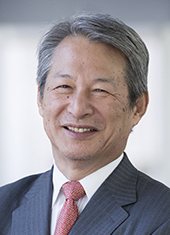
SHIRAISHI Takashi
Chancellor, Prefectural University of Kumamoto
Shiraishi Takashi, born in 1950 in Japan; majored in international relations at the University of Tokyo (1972) and obtained Ph.D. in History from Cornell University in 1986. He taught at the University of Tokyo (1979-1987), Cornell University (1987-98), Kyoto University (1996-2005), and National Graduate Institute for Policy Studies (GRIPS) (2005-2009). He served as Executive Member, Council for Science and Technology Policy, Cabinet Office (2009-2012), President, GRIPS (2011-2017), President, Institute of Developing Economies-JETRO (2007-2018) and University Professor, Ritsumeikan University (2017-2018). He currently serves as Chancellor, Prefectural University of Kumamoto (since 2018). He was awarded the Medal with Purple Ribbon in 2007 and designated to the Order of Cultural Merit, 2016. In 2017, he received the Medal of Bintang Jasa Utama from the Republic of Indonesia for his contribution to Indonesian economic and education fields.
YOSHIOKA Keiko
Senior staff writer of the Asahi Shimbun
YOSHIOKA Keiko is a senior staff writer of the Asahi Shimbun, a Japanese leading newspaper. She has over 20 years’ experience in reporting on China issue, including as correspondent at Beijing and Shanghai. She also served as Senior Asia correspondent based in Bangkok to cover Belt and Road Initiative by China. She was a visiting fellow at Center for Strategic and International Studies (CSIS).
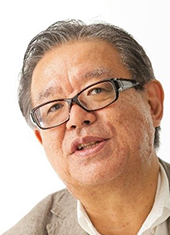
MURAI Jun
Dean, API Institute of Geoeconomic Studies and API Senior Fellow
Distinguished Professor, Keio University
Co-Director, Keio University Cyber Civilization Research Center
Special Advisor to the Cabinet
MURAI Jun received his Ph.D. in Computer Science in 1987 from Keio University, and majored in Computer Science, Computer Network, and Computer Communication. In 1984 he established JUNET (Japan University UNIX Network), the first network in Japan connecting multiple universities. In 1988 he established the WIDE (Widely Integrated Distributed Environment) Project, a Japanese Internet research consortium. He has long been engaged in research related to Internet technology platforms, and is known as the Father of the Internet in Japan, and as the Internet Samurai in international circles. He is a member of the Strategic Headquarters for the Promotion of an Advanced Information and Telecommunications Network Society (IT Strategic Headquarters), and of the Cyber Security Policy Council, National center of Incident readiness and Strategy for Cybersecurity (NISC), Cabinet Secretariat. He also chairs and serves on many other governmental committees, and is active in numerous international scientific associations. He was a member of the Internet Architecture Board (IAB) from 1993-95, the board of trustees of the Internet Society (ISOC) from 1997-2000, and the board of directors of the Internet Corporation for Assigned Names and Numbers (ICANN) from 1998-2000. He was inducted into the 2013 Internet Hall of Fame (Pioneer), and his distinctions include the 2011 IEEE Internet Award, the 2005 Jonathan B. Postel Service Award, and Knight of the Legion of Honor, which he was awarded in 2019 by the French government.
NAGASHIMA Akihisa
Member, House of Representatives
NAGASHIMA Akihisa is a sixth-term member of the House of Representatives with the ruling Liberal Democratic Party. He currently serves as the ranking member of the House Committee on National Security. He previously served as Senior Vice Minister of Defense in 2012. Prior to his political career, Mr. Nagashima worked as Adjunct Senior Fellow at the Council on Foreign Relations. He received LL.M. from Keio University in 1988 and M.A. from the Paul H. Nitze School of Advanced International Studies of the Johns Hopkins University in 1997.
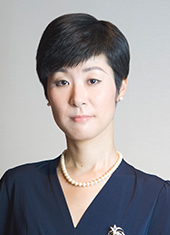
MATSUBARA Mihiko
Chief Cybersecurity Strategist, NTT Corporation
MATSUBARA Mihiko is Chief Cybersecurity Strategist, NTT Corporation, Tokyo, being responsible for cybersecurity thought leadership. She previously worked at the Japanese Ministry of Defense before her MA at the Johns Hopkins School of Advanced International Studies in Washington DC on Fulbright. Prior to NTT, she was VP and Public Sector Chief Security Officer for Asia-Pacific at Palo Alto Networks. She served on Japanese government’s cybersecurity R&D policy committee between 2014 and 2018.
Mihoko is a prolific writer and has published articles from the Council on Foreign Relations, Lawfare, New America, the RUSI Journal, etc. She published a cybersecurity book from the Shinchosha Publishing Co., Ltd in 2019, which won a JFY 2020 award by the Okawa Foundation for Information and Telecommunications. She has spoken at various engagements internationally such as the NIST Cybersecurity Risk Management Conference 2018 in Baltimore, the RSA Conference 2018 and 2019 in San Francisco, the EU Cyber Forum 2019 in Brussels, and CyCon 2015 and 2019 in Tallinn, Estonia. She is Adjunct Fellow at the Pacific Forum, Honolulu, and Associate Fellow at the Henry Jackson Society, London.
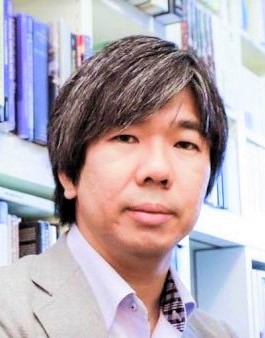
HOSOYA Yuichi
Managing Director, Research Director, API
Professor, Faculty of Law, Keio University
HOSOYA Yuichi is professor of international politics at Keio University, Tokyo. Professor Hosoya was a member of the Advisory Board at Japan’s National Security Council (NSC) (2014-2016). He was also a member of Prime Minister’s Advisory Panel on Reconstruction of the Legal Basis for Security (2013-14), and Prime Minister’s Advisory Panel on National Security and Defense Capabilities (2013). Professor Hosoya studied international politics at Rikkyo (BA), Birmingham (MIS), and Keio (Ph.D.). He was a visiting professor and Japan Chair (2009–2010) at Sciences-Po in Paris (Institut d’Études Politiques) and a visiting fellow (Fulbright Fellow, 2008–2009) at Princeton University. His research interests include the postwar international history, British diplomatic history, Japanese foreign and security policy, and contemporary East Asian international politics. His most recent publications include Security Politics: Legislation for a New Security Environment (Tokyo: JPIC, 2019). His comments appeared at New York Times, Washington Post, Financial Times, USA Today, Die Welt and Le Monde, as well as at major Japanese media.
FUNABASHI Yoichi
Chairman, API
Formerly editor-in-chief of the Asahi Shimbun, he is a member of the International Institute for Strategic Studies (IISS) Advisory Council. His books include “What is a think tank?” (2019). He received Ph.D. from Keio University in 1992.
For questions or inquiries about this symposium, please contact us here.
(Disclaimer)
The views expressed in this API Symposium on Geoeconomics do not necessarily reflect those of API, the API Institute of Geoeconomic Studies, or any other organizations to which the speakers belong.
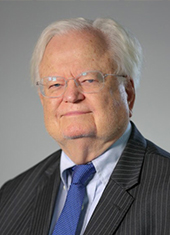
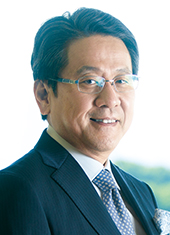



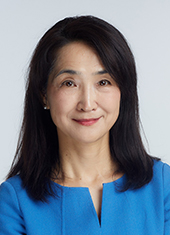

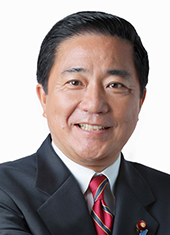


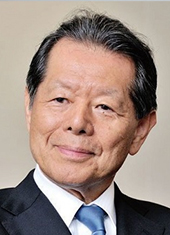
 APIニュースレター 登録
APIニュースレター 登録